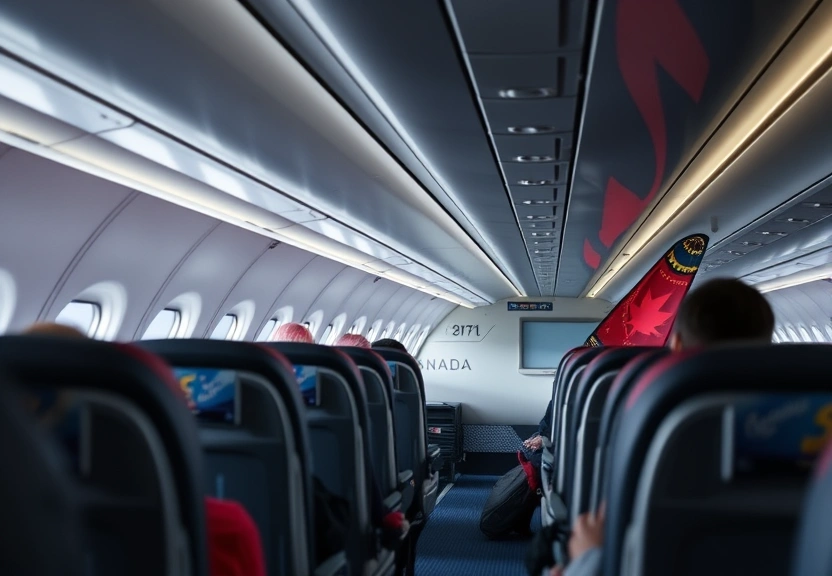Air Canada Cabin Crew Strike Enters Third Day, Leaving Passengers Stranded
As the Air Canada cabin crew strike enters its third day, thousands of passengers find themselves stranded at airports across the country. This labor dispute, which began on [insert start date], has led to significant disruptions in flight schedules, affecting travelers’ plans and raising concerns about the airline’s operational stability. While negotiations are ongoing, the impact of the strike is being felt widely, with many passengers uncertain about their travel arrangements.

Air Canada, one of the leading airlines in Canada, is facing challenges as the cabin crew union demands better working conditions, wages, and benefits. This article will explore the causes of the strike, its impact on passengers, and what travelers can do to navigate this difficult situation. We will also provide insights into the broader implications of labor disputes in the airline industry.
Understanding the Cabin Crew Strike
The Air Canada cabin crew strike is rooted in dissatisfaction among the airline’s staff regarding their working conditions and compensation. Cabin crew members have expressed concerns about long hours, inadequate rest periods, and stagnant wages, which they argue do not reflect the rising cost of living.
Background of the Labor Dispute
This strike is not an isolated incident; it represents a larger trend within the airline industry where labor unions are increasingly advocating for better treatment of employees. The COVID-19 pandemic exacerbated existing issues, leading to widespread layoffs and a significant increase in workload for those who remained employed. As travel demand rebounded, cabin crew members found themselves stretched thin, prompting calls for action.
Impact on Passengers
The ongoing strike has left many passengers stranded, with thousands of flights canceled or delayed. Airports are experiencing overcrowding as travelers scramble to find alternative arrangements. This situation has led to frustration, confusion, and anxiety among those affected.
Flight Cancellations and Delays
- Over 1,000 flights canceled in the first two days of the strike.
- Significant delays reported at major Canadian airports, including Toronto Pearson International Airport and Vancouver International Airport.
- Passengers are experiencing long wait times at customer service desks as they seek rebooking options.
Travelers’ Reactions and Experiences
Many travelers have taken to social media to express their frustrations. Some have shared stories of missed connections, unexpected expenses, and the emotional toll of being stranded. The disruption has prompted passengers to look for alternative modes of transportation, including trains, buses, and rental cars, often at inflated prices due to high demand.
Air Canada’s Response to the Strike
In response to the strike, Air Canada has issued statements emphasizing its commitment to resolving the dispute through negotiations. The airline has also implemented contingency plans to minimize the impact on passengers, including the deployment of management staff to assist in operations. However, these measures have not fully alleviated the frustrations of stranded travelers.
Negotiation Efforts
Negotiations between Air Canada and the cabin crew union are ongoing, with both sides expressing a willingness to find a resolution. However, the complexities of labor disputes mean that reaching an agreement can take time. The airline has stated its desire to ensure that its employees are fairly compensated while also maintaining financial viability.
What Passengers Can Do
For those stranded due to the Air Canada cabin crew strike, there are several steps to take to mitigate the impact of this disruption:
- Stay Informed: Regularly check Air Canada’s website and social media channels for updates on flight statuses and potential rebooking options.
- Contact Customer Service: If your flight has been canceled or delayed, reach out to Air Canada’s customer service for assistance. Be prepared for long wait times.
- Explore Alternatives: Consider alternate airlines or modes of transportation to reach your destination. Websites and apps that aggregate travel options can help streamline this process.
- Document Everything: Keep records of all expenses incurred due to the disruption, as you may be eligible for compensation depending on the airline’s policies.
- Be Patient: Understand that this is a challenging situation for everyone involved, including airline staff who are doing their best to assist under difficult circumstances.
Broader Implications of Labor Disputes in the Airline Industry
The Air Canada cabin crew strike highlights a growing trend in the airline industry where employees are increasingly vocal about their rights and working conditions. As labor disputes escalate, airlines may face reputational damage and financial losses, prompting a reevaluation of employee relations strategies.
The Importance of Employee Satisfaction
Employee satisfaction is crucial for operational efficiency and customer service. Airlines that invest in their workforce often see improved performance, lower turnover rates, and higher levels of employee morale. The current strike serves as a reminder that airlines must prioritize the well-being of their staff to ensure a sustainable business model.
Future of Labor Relations in the Airline Sector
As the airline industry continues to recover from the pandemic, labor relations will likely become a focal point for both management and employees. The outcome of the Air Canada strike may set a precedent for how other airlines handle similar disputes in the future.
Frequently Asked Questions (FAQ)
1. What should I do if my flight is canceled due to the Air Canada strike?
If your flight is canceled, contact Air Canada’s customer service for rebooking options. Be sure to check their website for real-time updates.
2. Is Air Canada offering compensation to stranded passengers?
Air Canada has stated that it will review compensation claims on a case-by-case basis. Keep all receipts and documentation of additional expenses incurred due to the disruption.
3. How long is the strike expected to last?
It is difficult to predict the duration of the strike as negotiations are ongoing. Updates will be provided by Air Canada as the situation evolves.
4. Are other airlines affected by this strike?
While the strike primarily affects Air Canada, increased passenger volume at other airlines may lead to delays and cancellations as they accommodate the overflow of stranded travelers.
5. Can I change my travel plans without penalty due to the strike?
Air Canada has implemented flexible rebooking policies for affected passengers. Check their website or contact customer service for specific details regarding your situation.
Conclusion
The Air Canada cabin crew strike has entered a critical phase, leaving many passengers stranded and frustrated. As negotiations continue, the airline must navigate the complexities of labor relations while also addressing the immediate needs of its customers. For travelers affected by the strike, staying informed and exploring alternative options are key to managing the disruptions. This incident serves as a reminder of the vital connection between employee satisfaction and operational stability in the airline industry. As we observe the developments of this strike, it will be essential to watch how Air Canada and the industry as a whole respond to the growing calls for better working conditions and fair treatment of airline staff.
📰 Original Source
Este artigo foi baseado em informações de: https://www.investing.com/news/stock-market-news/air-canada-grounded-as-striking-union-defies-order-to-get-back-to-work-4196609


